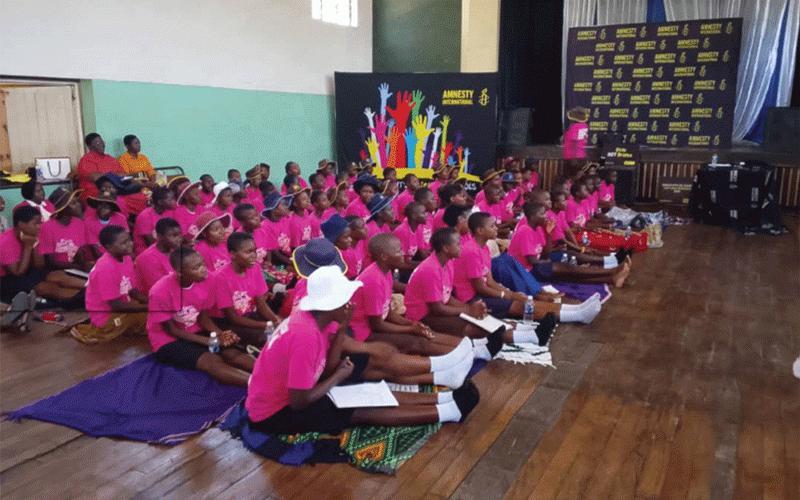Africa-Press – Zimbabwe. IN a dimly lit Moffat Hall in Mutare, young rural school girls’ eyes are glued to the screen as the film At The End of the Rainbow unfolds.
The story resonates deeply within them, sparking a transformation that will change the course of their lives forever.
This film has become a beacon of hope for rural schoolgirls across the country, tackling topics such as sexual and reproductive health.
The short film is making waves in rural Zimbabwe, creating an impactful dialogue around the critical issues of sexual and reproductive health rights, child marriage and obstetric fistula.
Produced by Bustop TV with the support of Amnesty International Zimbabwe, the 17-minute film tells the story of Onai, a young girl whose life spirals after being sexually abused by her school head, subsequently married off at a tender age, and ultimately suffering from a devastating obstetric fistula during childbirth.
The film was screened recently at the commemoration of the International Day of the Girl Child in Mutare, gathering 75 rural girls from Nyagundi and Gwirindindi secondary schools in Manicaland province.
The event, themed Girls in Conflict, served not only as a platform for the screening but also as a crucial opportunity for these young women to discuss the harsh realities of child marriage and its repercussions on their health and rights.
According to Rose Muzerengi, campaigns coordinator for Amnesty International Zimbabwe, the film sheds light on a disturbing but often overlooked issue.
“This film aims to raise awareness about these issues and advocate the prevention of child marriage and fistula. Girls in rural areas remain the most vulnerable to abuse and exploitation,” she said.
The narrative of Onai resonates deeply with many girls in Zimbabwe, where societal norms often prioritise marriage over education.
Muzerengi added: “The film highlights the connection between child sexual abuse, child marriage and obstetric fistula.”
These issues have devastating consequences, further marginalising girls who are already at risk of social isolation and health complications.
The screening sparked significant emotional responses among the attendees.
Sharon Chirasika, a student from Nyagundi Secondary School, expressed her gratitude.
“This film has opened my eyes. I had no idea child marriages could lead to obstetric fistula. I am grateful for the knowledge and support. I am now determined to stand up for my rights and help my friends do the same. I want to thank Amnesty International Zimbabwe for giving us this platform to discuss these important issues,” she said.
Brenda Marange echoed similar sentiments, emphasising the personal empowerment she gained from the film.
“I will never forget this film. It showed me that my body is mine and I deserve to make choices about my own health and future. I am speaking out against child marriages and advocating girls’ education — thank you, Amnesty International Zimbabwe, for empowering us,” she said.
Despite the positive reactions and increased awareness, challenges remain for girls in these rural communities.
Child marriage continues to be a prevalent issue, often exacerbated by economic hardship and cultural traditions.
A recent report from the United Nations indicates that Zimbabwe has one of the highest rates of child marriage in Southern Africa, with many girls being given away in marriage before they reach the age of 18.
Muzerengi called for action, urging the full implementation of the Child Protection Act, which was signed into law by President Emmerson Mnangagwa last year.
“We want to ensure that perpetrators of child abuse and forced marriages are held accountable. We urge communities to shift their perception of girls and recognise their full potential,” she said.
Patricia Makoni, a human rights activist, said End of the Rainbow serves not only as a film, but as a catalyst for change.
“It is the film’s ability to empower young girls to assert their rights and advocate their futures that represents a significant step towards tackling the deeply ingrained issues of child marriage and reproductive health in Zimbabwe,” she said.
Makoni said the film is helping to pave the way for a society where girls can dream, thrive and choose their own paths without fear of abuse or early marriage.
Through the collaboration of organisations like Bustop TV and Amnesty International Zimbabwe, rural schoolgirls are being equipped with the knowledge and empowerment they need to reclaim their futures.
For More News And Analysis About Zimbabwe Follow Africa-Press






